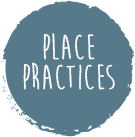

1. Making new Memories
The group are taken to two sites close to the Studio including the Gallery Gardens and the site of the Old Library in Oldham. Here the group experience the ‘ordinary’ space by playing games familiar from the Studio-based workshops. The point of the work is to shift the perception of the ‘ordinary’ passing places by attaching unusual memories (e.g. outside the Gallery with the clapping game). This is the first time the group venture out in public as part of the session. The space outside the Old Library, where the group sing All Shook Up (not without hesitation at first) prompts the nearby workmen to stop and watch. (Not on film.) The juxtaposition of ordinary, unremarkable setting and an old ‘Elvis’ pop song helps the group to think of that place differently. A new and affectionate memory has been created for them to remember as they pass that area in the future.
3. Tree wishes
The exercise begins by sharing with one another hopes, dreams and wishes. Examples that are given range from wanting to learn English, to become employed or simply to be able to get a better job.
Each member writes their own dream or wish on a piece of paper; this is personal and doesn’t have to be shared with the rest of group. On one side are the words and on the other is decoration, which is to be moulded into a 3D fruit shape.
The ‘fruit’ hangs on the trees just outside the building high in a tree. They act as a symbol for the hopes and dreams that are out of their grasp and have to be reached for. Situated on a main passing place in Oldham, they remain in the tree for some months. Similar to the Gels exercise which situates memories and places within the fabric of Oldham Theatre Workshop, these fruit-wishes become part of the living growth of the town.
5. Outside Tea Party
The session begins as any other, with tea and coffee. After this opener, it is explained that the same thing will happen again – but in another place. In the Gallery Gardens just outside the building, the tables and chairs, cups, saucers and plates of fruit are placed in and around the trees, creating an abstract echo of the familiar routine inside the studio.
The site was subverted through an anarchic performance of place. The group ‘performed’ the opening minutes of each weekly session, replicating interaction with one another and exaggerating behaviour of eating, drinking and listening to music. Facilitating a new experience in a public location prompts the group to rethink this space in Oldham through these unconventional new memories of the place.
7. Dovestone Story Trail
This activity concerns the stories of the clay models created by the group whilst on an expedition to Dovestone Reservoir. Within the vicinity, the group place their creations in trees, walls and even in the water itself. The group members are asked to improvise a story, which explains how their character got to the spot in which they stand. The others are encouraged to listen and then respond by asking questions about the character or the story.
The metaphor of the newly made or newly arrived in a place of some history is clear. Weaving the participants’ stories of their clay models with this place was one more exercise in engaging with place and dislocation.
2. Changing the space in Outdoor Games
The game begins in Studio One (not in clip), using a ball, chair and the scale of the room. It is a simple exercise with teams of two/three, negotiating an obstacle style set up and reaching the ball – without being seen by the ‘leader’. (This last is in the style of the UK children’s game ‘Grandmother’s Footsteps’.) The game is complete when both members of the team have completed two tasks and one has reached for the ball at the end.
In this clip, the game is taken to another place. In the Gallery Gardens the scale of the game is made bigger. Using ‘obstacles’ of the surroundings the game is adapted to the location. This includes using the steps as a starting point, fence instead of chairs, various markings within the area and a leaf as the prize. Gaining a ‘different’ form of familiarity with a passing place is developed out of a game that started in the studio.
4. Reflections
A mirror is placed in front of members of the group. In the first space, this is inside the regular working room of the Studio. The group are then asked what they see when they stand in front of the mirror; their response is focused on their own physical appearance. In the second instance, the mirror is placed outside the building and the question is asked again. This time, the group’s responses are impacted by other factors; they are now aware of the background in the reflection, the weather and even people passing by.
In the third location, the mirror is situated to capture a wider view of the surroundings. This changes the group’s response yet again, noticing nearby buildings, roads and neighbouring terrain. This exercise asks the group to consider the different perspective one has on oneself when positioned in broader contexts and locations; different places determine a different view when reflecting on oneself. This exercise is also one that considers the migrant participants as positioned within Oldham, of course.
6. Fruit Memory
An extension of ‘Tea Party’, during this session, one of the group members made a comment about the fruit being placed in and around the trees. She recognised the hanging fruit in the trees as a reminder of her games as a little girl and went on to describe her adventures in Guinea-Bissau attempting to knock the fruit down. The game consisted of throwing a twig at the fruit forcing it to fall to the ground.
Being in a different space to the Studio, the positioning of the fruit triggered a memory that she shared with everyone. When another member of the group heard this, he attempted to reenact the hanging fruit with a string and a tangerine. Everyone joins in with the two ladies demonstrating and sharing the technique of throwing the twig with everybody there.
An unplanned moment, this conjunction of old memory and new place was emphasised by James, the facilitator, who immediately established the replaying of an old game for all participants.

